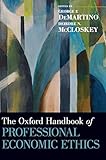The oxford handbook of professional economic ethics / DeMartino, George F. (Ed.) & McCloskey, Deirdre N. (Ed.)
Material type: TextLanguage: English Publication details: UK : Oxford University Press, 2016.Description: xxii, 777 p. ; 30 cmISBN:
TextLanguage: English Publication details: UK : Oxford University Press, 2016.Description: xxii, 777 p. ; 30 cmISBN: - 9780199766635
- 174.4 DEM
| Item type | Current library | Collection | Call number | Status | Barcode | |
|---|---|---|---|---|---|---|
 Reference
Reference
|
Ranganathan Library | REF | 174.4 DEM (Browse shelf(Opens below)) | Available | 036727 |
Browsing Ranganathan Library shelves Close shelf browser (Hides shelf browser)

|

|

|

|

|

|

|
||
| 155.503 BRO Encyclopaedia of adolescence : Normative processes in development / | 155.503 BRO Encyclopaedia of adolescence : Normative processes in development / | 172.42 LAZ Oxford Handbook of Ethics of War / | 174.4 DEM The oxford handbook of professional economic ethics / | 174.93840973 BAB The SAGE guide key issues in mass media and law / | 174.93840973 BAB The SAGE guide key issues in mass media and law / | 174.95003 BAR Viva- facts on file encyclopedia of ethics in science and technology / |
For over a century the economics profession has extended its reach to encompass policy formation and institutional design while largely ignoring the ethical challenges that attend the profession's influence over the lives of others. Economists have proven to be disinterested in ethics. Embracing emotivism, they often treat ethics a matter of mere preference. Moreover, economists tend to be hostile to professional economic ethics, which they incorrectly equate with a code of conduct that would be at best ineffectual and at worst disruptive to good economic practice. But good ethical reasoning is not reducible to mere tastes, and professional ethics is not reducible to a code. Instead, professional economic ethics refers to a new field of investigation-a tradition of sustained and lively inquiry into the irrepressible ethical entailments of academic and applied economic practice. The Oxford Handbook of Professional Economic Ethics explores a wide range of questions related to the nature of ethical economic practice and the content of professional economic ethics. It explores current thinking that has emerged in these areas while widening substantially the terrain of economic ethics. There has never been a volume that poses so directly and intensively the question of the need for and content of professional ethics for economics. The Handbook incorporates the work of leading scholars and practitioners, including academic economists from various theoretical traditions; applied economists, beyond academia, whose work has direct and immense social impact; and philosophers, professional ethicists, and others whose work has addressed the nature of professionalism and its implications for ethical practice.
There are no comments on this title.
